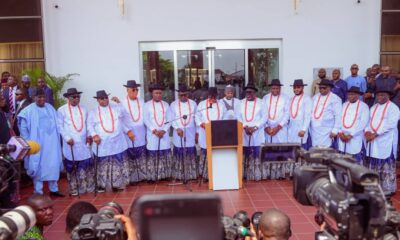Business
Renewable Energy: SON Launches Standards For Solar Components
The Standards Organisation of Nigeria (SON) yesterday launched a range of new standards for solar system components in line with the nation’s drive for use of renewable energy.
The new industrial standards are for solar panels, batteries, inverters, photovoltaic (PV), charge controllers and metering standards.
The Director General of SON, Mallam Farouk Salim, said in Abuja that the initiative was part of the mandate of the Nigerian Energy Support Programme (NESP).
NESP is a technical assistance programme co-funded by the European Union (EU) and the German Government.
According to him, the new solar components standards will support the Federal Government’s objective to accelerate access to energy, by creating a regulated solar PV market in the country.
He said that setting up and adhering to the standards would unlock the potential opportunity within the Nigerian market for renewable energytechnology deployments.
“Globally, lack of enough efforts to provide sufficient energy has resulted in the challenges and impacts that affect the climate, causing untold greenhouse effects.
“In Nigeria, we crave for high energy sufficiency while expecting to protect nature. Therefore, we can no longer afford to ignore actions against greenhouse effects.
“It is to this end that these sets of standards and the other approved standards in this category are considered very important, timely and instruments for actions to support energy sufficiency,” he said.
The director general said that the standards would also mitigate the negative effects of climate change.
“As these standards are launched today, opportunities for fair trade practices, lowered cost of manufacture/assembly, consumer satisfaction, business expansion, employment creation and career development will all be enhanced.
“I therefore urge you to comply with all the requirements of these standards to ensure good manufacturing practices and the best product quality that will satisfy all consumers at all times,” he said.
Salim explained that the SON would carry out stakeholders awareness campaign and strict enforcement to ensure that manufacturers, project developers and users complied with the new standards.
The Managing Director of the Nigeria Electricity ManagementServices Agency (NEMSA) and Chief Electrical Inspector of the Federation, Engr. Peter Ewesor, said that the launch was a milestone in the effort toward enforcement of standards and regulations.
He said that NEMSA’s enforcement team would work with SON to ensure that manufacturers of electrical materials and installationsupheld stipulated standards.
Business
Lokpobiri Condemns Abandoned Refinery Project in N’Delta … Vows Revival
Business
FG Unveils Industrialisation Strategies In 2025 … To Conduct MSMEs Census
Business
Coy Strengthens Commitment To Nigeria’s Energy Future
-

 News3 days ago
News3 days agoFubara Attends PDPGF Meeting In Asaba …..Back Court Verdict On National Secretary Position
-
Nation3 days ago
Okehi Clan Demands Recognition, Upgrade Of Chieftaincy Stool
-
Business18 hours ago
PETROAN Accuses Crude Oil Producers Of Diverting 500,000bpd Refineries-Bound Product
-
Business3 days ago
REA, RESCOs Sign Agreement To Establish 23 Mini-grids
-
News21 hours ago
MAN Warns Against Further Hike In Electricity Tariff
-
Sports17 hours ago
W’Cup: Eagles Get Dates for Rwanda, Zimbabwe Qualifiers
-
News3 days ago
Telecom Operators Dismiss Talks With NLC On Tariff Hike
-
Politics3 days ago
How Akande Lied Against Me Over Bola Ige’s Case – Ladoja

